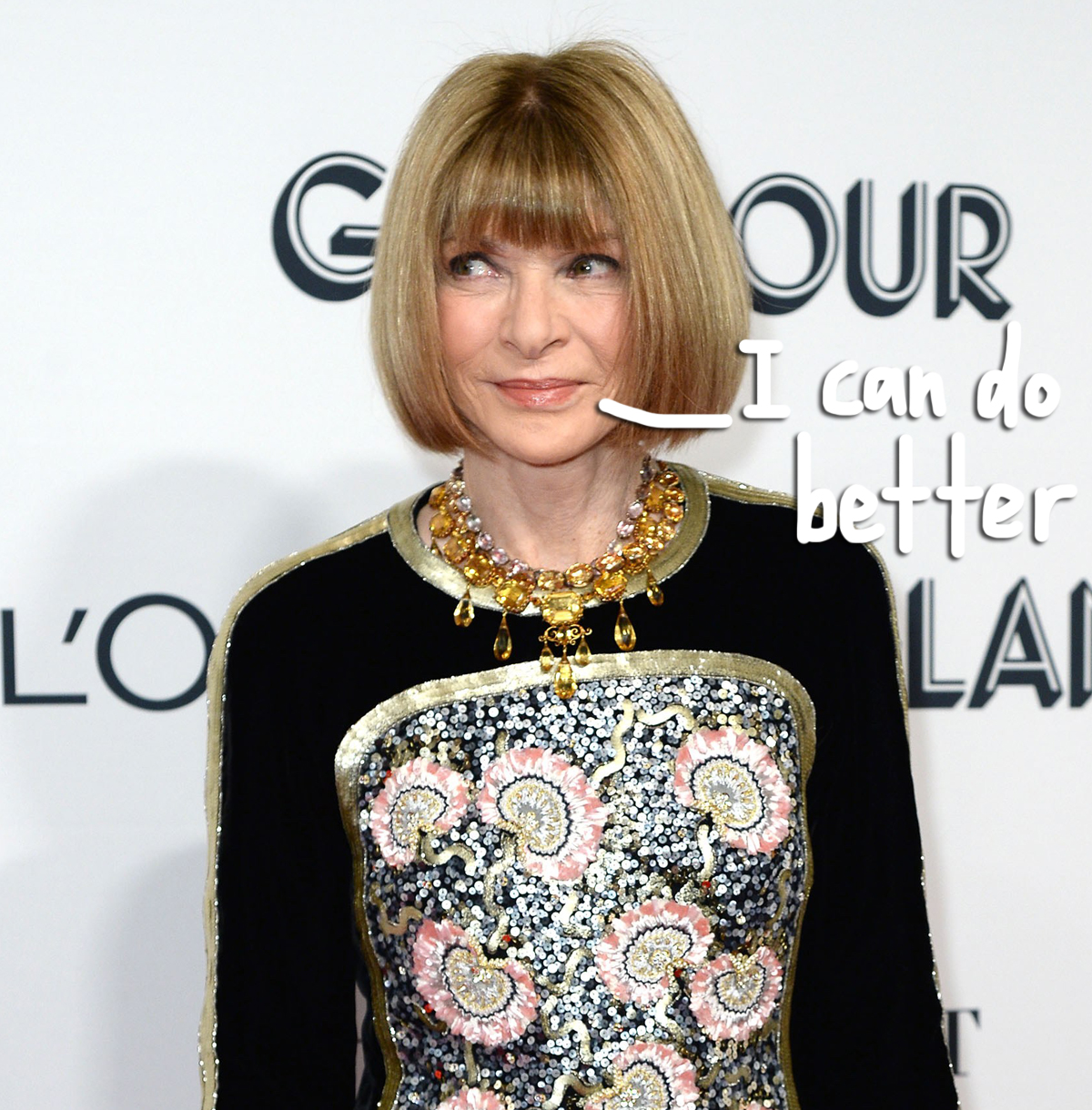Anna Wintour, the iconic editor-in-chief of Vogue, is often hailed as a fashion powerhouse. But behind the glossy magazine covers lies a world of controversy that has sparked heated debates in the fashion industry. From allegations of a toxic work environment to questions about diversity and representation, Anna's reign at Vogue has been far from flawless. In this article, we'll dive deep into the controversies surrounding Anna Wintour and explore how these issues have shaped the fashion world as we know it.
Picture this: you're walking through the bustling streets of New York City, and suddenly, you spot her – the woman with the signature bob haircut and dark sunglasses. Yes, we're talking about Anna Wintour. She's not just the face of Vogue; she's a cultural icon. But as much as she's celebrated for her impeccable taste, she's also been at the center of some pretty intense controversies. Let's unpack what's been going on in the world of high fashion.
Anna Wintour's influence is undeniable. From red carpet moments to runway shows, her decisions shape the trends we see today. Yet, the controversies surrounding her leadership have cast a shadow over her legacy. In this article, we'll explore these controversies, the impact they've had on the industry, and what it all means for the future of fashion.
Read also:How Did Jordan Warkol Pass Away Unveiling The Tragic Story Behind The Headlines
Biography of Anna Wintour
Early Life and Career
Before diving into the controversies, let's take a step back and understand who Anna Wintour really is. Born on November 3, 1949, in London, England, Anna grew up in a family deeply immersed in journalism. Her father, Charles Wintour, was the editor of the Evening Standard. This early exposure to the world of media played a significant role in shaping her career path.
Anna's journey in the fashion world began when she moved to the United States in the 1970s. She started as a junior fashion editor at Harper's Bazaar and quickly climbed the ranks. Her career took a monumental turn when she became the editor-in-chief of American Vogue in 1988, a position she has held ever since.
| Full Name | Anna Wintour |
|---|---|
| Date of Birth | November 3, 1949 |
| Place of Birth | London, England |
| Profession | Editor-in-Chief of Vogue |
| Spouse | David Sherzer |
Anna Wintour Controversy: The Toxic Work Environment
Reports of a Ruthless Boss
One of the most talked-about controversies surrounding Anna Wintour is her reputation as a tough and demanding boss. Employees at Vogue have often described her as intimidating and unapproachable. Stories of her infamous "glare" have become legendary in the fashion world. But is this perception justified?
According to various reports, working under Anna can be a high-pressure experience. Long hours, strict deadlines, and a no-nonsense attitude are just a few aspects of her management style. Some employees have even claimed that the work environment at Vogue can be toxic, with fear being a common motivator. However, others argue that Anna's leadership style is simply misunderstood and that her demands reflect the high standards of the fashion industry.
Anna Wintour and Diversity Issues
Representation in Fashion
Another major controversy surrounding Anna Wintour is the issue of diversity in fashion. Critics have long accused Vogue of lacking representation of people of color, different body types, and diverse backgrounds. This criticism gained significant attention during the Black Lives Matter movement, where many voices called out the fashion industry for its lack of inclusivity.
In response to these criticisms, Anna issued a public apology, acknowledging the need for change. She promised to take steps to improve diversity within Vogue. However, some skeptics remain unconvinced, pointing out that actions speak louder than words. The fashion world is watching closely to see if these promises will translate into tangible changes.
Read also:Chers Boyfriends Age The Untold Story Behind Her Love Life
Anna Wintour Controversy: The Power Behind the Throne
Influence on the Fashion Industry
Anna Wintour's influence extends far beyond the pages of Vogue. She's often referred to as the "most powerful woman in fashion," and her decisions have a ripple effect throughout the industry. But with great power comes great responsibility, and Anna's decisions have not always been met with universal approval.
For instance, her choice of models, designers, and celebrities for Vogue's covers and features can make or break careers. This power has led to accusations of favoritism and elitism. Some argue that Anna's preferences cater to a narrow segment of the population, leaving others feeling excluded. This debate raises important questions about the role of gatekeepers in the fashion industry.
Anna Wintour Controversy: The Glitz and the Grit
Behind the Scenes of Fashion Week
Fashion Week is one of the most glamorous events in the fashion calendar, and Anna Wintour is often at the center of it all. However, behind the glitz and glamour lies a world of hard work, long hours, and intense pressure. Critics have pointed out that the fashion industry's obsession with perfection can lead to unhealthy working conditions.
Anna's involvement in Fashion Week has been both praised and criticized. On one hand, she's credited with elevating the event to new heights. On the other hand, some argue that her influence has contributed to the unrealistic standards that plague the industry. The debate continues as the fashion world grapples with the challenges of maintaining its allure while addressing its flaws.
Anna Wintour Controversy: The Impact on Young Designers
Supporting Emerging Talent
Anna Wintour is often seen as a mentor to young designers, offering them opportunities to showcase their work on the global stage. However, this support has also come under scrutiny. Some critics argue that Anna's choices favor established designers over newcomers, making it difficult for emerging talent to break into the industry.
Despite these criticisms, Anna has been instrumental in launching the careers of several renowned designers. Her ability to spot talent and provide platforms for creativity is undeniable. The question remains: how can the industry strike a balance between supporting established names and nurturing new talent?
Anna Wintour Controversy: The Business Side of Fashion
The Economics of Vogue
As the editor-in-chief of Vogue, Anna Wintour is not just responsible for editorial content; she also plays a crucial role in the business side of the magazine. This dual responsibility has led to some controversial decisions. Critics have accused Vogue of prioritizing advertisers' interests over editorial integrity.
For example, the inclusion of certain brands in Vogue's pages has raised eyebrows. Some argue that these decisions are driven by financial considerations rather than artistic merit. This tension between business and creativity is a common challenge in the media industry, and Anna's leadership at Vogue has brought this issue to the forefront.
Anna Wintour Controversy: The Public Apology
Acknowledging Mistakes
In recent years, Anna Wintour has made several public apologies, addressing some of the controversies surrounding her tenure at Vogue. These apologies have been both praised and criticized, depending on one's perspective. While some see them as genuine efforts to make amends, others view them as damage control.
Anna's willingness to acknowledge her mistakes and commit to change is a step in the right direction. However, the fashion world will be watching closely to see if these promises translate into meaningful action. The road to redemption is never easy, but it's a necessary step for growth and progress.
Anna Wintour Controversy: The Legacy
Shaping the Future of Fashion
As Anna Wintour continues to shape the fashion industry, her legacy remains a topic of discussion. Her contributions to the world of fashion are undeniable, but so are the controversies that have accompanied her career. The question is: how will history remember her?
Anna's influence extends beyond the pages of Vogue. She's been a driving force behind some of the most iconic moments in fashion history. However, the controversies surrounding her leadership have also left a mark. As the fashion world evolves, it's crucial to learn from these experiences and strive for a more inclusive and equitable future.
Anna Wintour Controversy: The Final Word
What It All Means
Anna Wintour's career is a fascinating study of power, influence, and controversy. Her impact on the fashion industry has been both transformative and polarizing. As we've explored in this article, the controversies surrounding her leadership raise important questions about the future of fashion.
The fashion world is at a crossroads, and the choices made today will shape the industry for generations to come. Anna Wintour's legacy will be remembered not only for her contributions to fashion but also for the challenges she faced and the lessons she taught. The key is to learn from the past and build a better future.
Conclusion: The Anna Wintour Controversy
In conclusion, Anna Wintour's career has been marked by both triumphs and controversies. Her influence on the fashion industry is undeniable, but the challenges she has faced highlight the need for change. As we move forward, it's essential to address the issues of diversity, inclusivity, and working conditions in the fashion world.
We invite you to join the conversation. Share your thoughts on Anna Wintour's legacy and the future of fashion. Your voice matters, and together, we can shape a better tomorrow. Don't forget to check out our other articles for more insights into the world of fashion and beyond.
Table of Contents
- Biography of Anna Wintour
- Anna Wintour Controversy: The Toxic Work Environment
- Anna Wintour and Diversity Issues
- Anna Wintour Controversy: The Power Behind the Throne
- Anna Wintour Controversy: The Glitz and the Grit
- Anna Wintour Controversy: The Impact on Young Designers
- Anna Wintour Controversy: The Business Side of Fashion
- Anna Wintour Controversy: The Public Apology
- Anna Wintour Controversy: The Legacy
- Anna Wintour Controversy: The Final Word


